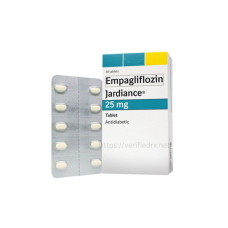WHAT IS THIS MEDICATION FOR?
Jardiance 25mg is used to lower blood sugar levels in people with type 2 diabetes (condition in which blood sugar is too high because the body does not produce or use insulin normally). Empagliflozin is also used to reduce the risk of stroke, heart attack, or death in people who have type 2 diabetes along with heart and blood vessel disease. Empagliflozin is also used in adults with heart failure to reduce the risk of needing to be hospitalized and death due to heart and blood vessel disease. Empagliflozin is in a class of medications called sodium-glucose co-transporter 2 (SGLT2) inhibitors.
HOW DOES IT WORK?
Empagliflozin lowers blood sugar by causing the kidneys to get rid of more glucose in the urine.
HOW TO USE?
Empagliflozin comes as a tablet to take by mouth. It is usually taken once a day in the morning with or without food. Take empagliflozin at around the same time every day. Follow the directions on your prescription label carefully, and ask your doctor or pharmacist to explain any part you do not understand. Take empagliflozin exactly as directed. Do not take more or less of it or take it more often than prescribed by your doctor.
SIDE EFFECTS:
Changes in your blood sugar. Urinating a lot, including at night; Increased thirst; Frequent, urgent, burning, or painful urination; Urine that is cloudy, red, pink, or brown; Pelvic or back pain. (In women) Vaginal odor, White or yellowish vaginal discharge (may be lumpy or look like cottage cheese), or Vaginal itching. (In men) Redness, Itching, or Swelling of the penis; Rash on the penis; Foul smelling discharge from the penis; or Pain in the skin around the penis. Feeling tired, weak, or uncomfortable; Fever and pain, Tenderness, Redness, and Swelling of the genitals or the area between the genitals and the rectum. Flu-like symptom. Rash. Hives. Itching. Difficulty swallowing or breathing. Swelling of the face, throat, tongue, lips, mouth, or eyes. Hoarseness. Nausea. Vomiting. Stomach-area pain. Tiredness. Difficulty breathing.
WHAT TO DO IF I MISS A DOSE?
Take the missed dose as soon as you remember it. However, if it is almost time for the next dose, skip the missed dose and continue your regular dosing schedule. Do not take a double dose to make up for a missed one.
PRECAUTIONS:
Before taking empagliflozin, tell your doctor and pharmacist if you are allergic to empagliflozin, any other medications, or any of the ingredients in empagliflozin tablets; what other prescription and nonprescription medications, vitamins, nutritional supplements, and herbal products you are taking or plan to take. Be sure to mention any of the following: angiotensin-converting enzyme (ACE) inhibitors such as benazepril, captopril, enalapril, fosinopril, lisinopril, moexipril, perindopril, quinapril, ramipril, and trandolapril; angiotensin receptor blockers such as azilsartan, candesartan, eprosartan, irbesartan, losartan, olmesartan, telmisartan, and valsartan; aspirin and other nonsteroidal anti-inflammatory medications (NSAIDs) such as ibuprofen and naproxen; digoxin; diuretics; or insulin or oral medications for diabetes such as glimepiride, glipizide, glyburide, and tolbutamide. Tell your doctor if you are on dialysis. Tell your doctor if you regularly drink alcohol or sometimes drink large amounts of alcohol in a short time (binge drinking) or are on a low sodium diet; if you have or have ever had urinary tract infections or problems with urination, low blood pressure, high cholesterol, heart failure, pancreatic disease including pancreatitis (swelling of the pancreas) or have had surgery on your pancreas, yeast infections in the genital area, or kidney or liver disease. If you are male, tell your doctor if you have never been circumcised. Tell your doctor if you are eating less due to illness, surgery, or a change in your diet or if you are unable to eat or drink normally due to nausea, vomiting, diarrhea, or if you become dehydrated from being in the sun too long; if you are pregnant, plan to become pregnant, or are breastfeeding. Do not breastfeed while you are taking empagliflozin. Tell your doctor if you become pregnant while taking empagliflozin; if you are having surgery, including dental surgery,
WHEN DO I NEED TO SEEK MEDICAL HELP?
Empagliflozin may cause dizziness, lightheadedness, and fainting when you get up too quickly from a lying position. If you have this problem, call your doctor. This problem is more common when you first start taking empagliflozin. To avoid this problem, get out of bed slowly, resting your feet on the floor for a few minutes before standing up. Ask your doctor what to do if you get sick, develop an infection or fever, experience unusual stress, or are injured. These conditions can affect your blood sugar and the amount of empagliflozin you may need.
FOOD RESTRICTIONS:
Be sure to follow all exercise and dietary recommendations made by your doctor or dietitian. It is important to eat a healthful diet and exercise regularly. Follow your doctor's instructions about drinking enough fluids throughout the day while you are on this medication.
HOW TO STORE:
Keep this medication in the container it came in, tightly closed, and out of reach of children. Store it at room temperature and away from excess heat and moisture (not in the bathroom).
THERAPEUTIC CLASSIFICATION:
Antidiabetic Agents.



